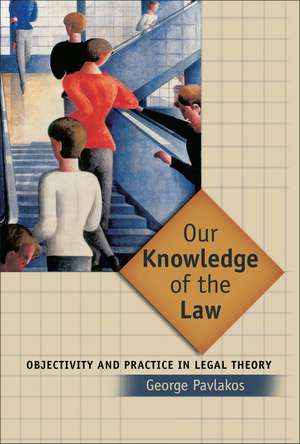Our Knowledge of the Law: Objectivity and Practice in Legal Theory
Autor Professor George Pavlakosen Limba Engleză Hardback – 13 iul 2007
Preț: 569.70 lei
Preț vechi: 662.43 lei
-14% Nou
Puncte Express: 855
Preț estimativ în valută:
109.03€ • 112.63$ • 90.74£
109.03€ • 112.63$ • 90.74£
Carte tipărită la comandă
Livrare economică 25 martie-08 aprilie
Preluare comenzi: 021 569.72.76
Specificații
ISBN-13: 9781841135038
ISBN-10: 1841135038
Pagini: 278
Dimensiuni: 156 x 234 x 22 mm
Greutate: 0.55 kg
Ediția:New.
Editura: Bloomsbury Publishing
Colecția Hart Publishing
Locul publicării:London, United Kingdom
ISBN-10: 1841135038
Pagini: 278
Dimensiuni: 156 x 234 x 22 mm
Greutate: 0.55 kg
Ediția:New.
Editura: Bloomsbury Publishing
Colecția Hart Publishing
Locul publicării:London, United Kingdom
Caracteristici
This book tackles the fundamental question of what makes legal knowledge possible.
Notă biografică
George Pavlakos is Research Chair in Globalisation and Legal Theory at Antwerp University. He was previously the City Solicitor's Trust Lecturer in Jurisprudence at Queen's University Belfast. He has published widely in the areas of legal theory and philosophy; his other books include a monograph in German entitled Rechtsontologie und praktische Vernunft (Nomos Verlag, 2007) and an edited book entitled Law, Rights and Discourse: The Legal Philosophy of Robert Alexy (Hart Publishing, 2007).
Cuprins
IntroductionPart One The Grounds of Knowledge1 Knowledge and Objectivity2 Objectivity and Grammar3 Grammar and Rule-following4 Practice, Normativity and ReasonsPart Two Knowledge and Legal Theory5 Conventionalism and the Grammar of Law6 Interpretivism and the Menace of Essentialism7 The Practice Theory of LawConcluding Remarks
Recenzii
Pavlakos' book aims to provide an original solution and a better understanding of the fundamental puzzles that should guide legal philosophical inquiry...[it] is creative and innovative, and readers will enjoy the freshness of his approach and insights. It has been said that general jurisprudence is a moribund subject. If this is true, it is regrettable because it means that we have abandoned the kind of critique that is developed through a general quest...To resuscitate the subject we need to be guided by and engaged with important questions, as Pavlakos has meritoriously done.
Pavlakos develops a highly sophisticated and carefully elaborated theory of legal knowledge... All in all this is an excellent work.
[an] excellent work that will repay long consideration and reflection.
George Pavlakos's Our Knowledge of the Law ... deserves particular notice as a very considerable contribution, not just to jurisprudence but to philosophy itself.Pavlakos ... provides his own closely argued resources for an exciting new future in the theory of law. This is a very important book.
Pavlakos develops a highly sophisticated and carefully elaborated theory of legal knowledge... All in all this is an excellent work.
[an] excellent work that will repay long consideration and reflection.
George Pavlakos's Our Knowledge of the Law ... deserves particular notice as a very considerable contribution, not just to jurisprudence but to philosophy itself.Pavlakos ... provides his own closely argued resources for an exciting new future in the theory of law. This is a very important book.
Descriere
In this book the author argues that knowledge is the outcome of an activity of judging, which is constrained by reasons (reflexive).
